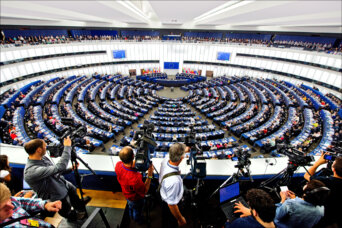- About
- Topics
- Story
- In-Depth
- Picks
- Opinion
- News
- Donate
- Signup for our newsletterOur Editors' Best Picks.Send
Read, Debate: Engage.
| topic: | Democracy |
|---|---|
| located: | Bosnia and Herzegovina, Belgium |
| editor: | Katarina Panić |
Once, I met a politician in his early forties. His party had a pre-election rally in a village in Bosnia. He complained that he came utterly unprepared. He said that he is busy all the time, and that now he has to speak to the crowd by heart.
“This would be my first face-to-face contact with citizens in four years. I almost forgot how it looks like,” he said at the time. “It seems to me that the last campaign was a very long time ago, something like BC. I have stage fright. My hands are getting sweaty. If only I could hide the nervousness.”
He was not re-elected. It seems that he couldn’t convince the voters that he used to be occupied with issues of their concern, not his.
The gap between ordinary people and the political elites these days is more significant than ever, and it becomes evident that the elections, one of the most important instruments of democracy, are not a sufficient tool to involve the people in the affairs of the state.
This is why the European Union is embarking on an attempt to bridge the gap between the political elites and ordinary citizens. The block had initiated the Future of the Europe program two years ago with the primary goal of giving citizens of both member states and aspiring countries a say about their priorities.
The COVID-19 pandemic has delayed the schedule, and the negotiations on the joint declaration between the European Parliament, Council of Europe, and the European Commission, have also taken some time to conclude. Hence, the first plenary took place last Saturday in Strasbourg.
“The program should allow citizens to address the issue that matters to them, and we have seen that priorities can change,” Dubravka Šuica, Vice President of the European Commission, told the media. “Who would have imagined twelve months ago that health and healthcare and our collective solidarity and resilience would become the most debated issues?”
Citizens must get involved in decision-making processes beyond the polls. The latest European Parliament’s periodic survey showed that only 23 percent of Europeans support the EU as it has operated thus far, while 47 percent want to see reform in the bloc.
“The world also is no longer centred on Europe, but on giants like Russia, like China, like India, like the United States, a world that is, unfortunately, less and less democratic, driven more and more by authoritarianism, zero-sums and ‘big beast’ attitudes and rules,” Guy Verhofstadt, the co-chair of the conference, said in the opening speech.
Image: European Parliament.

